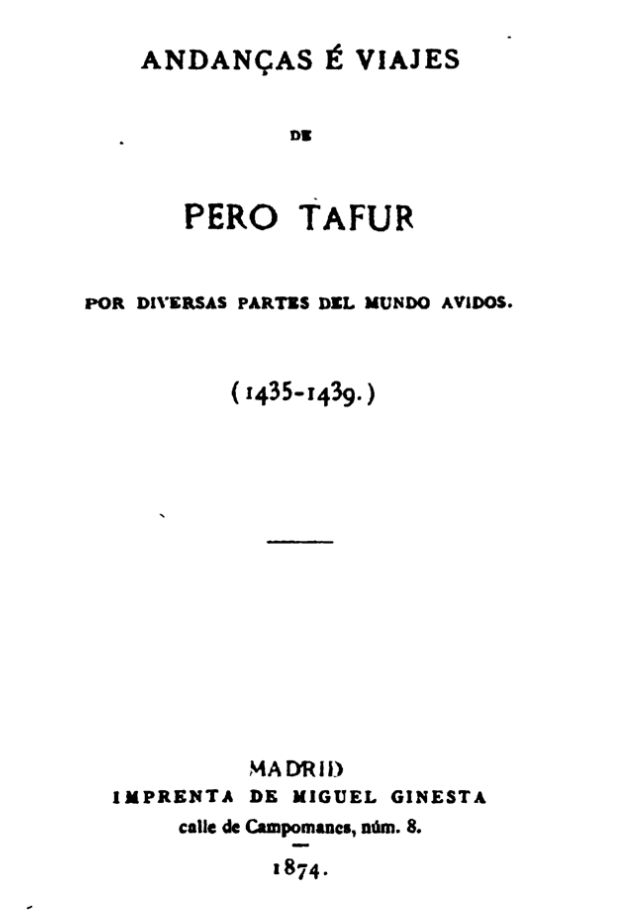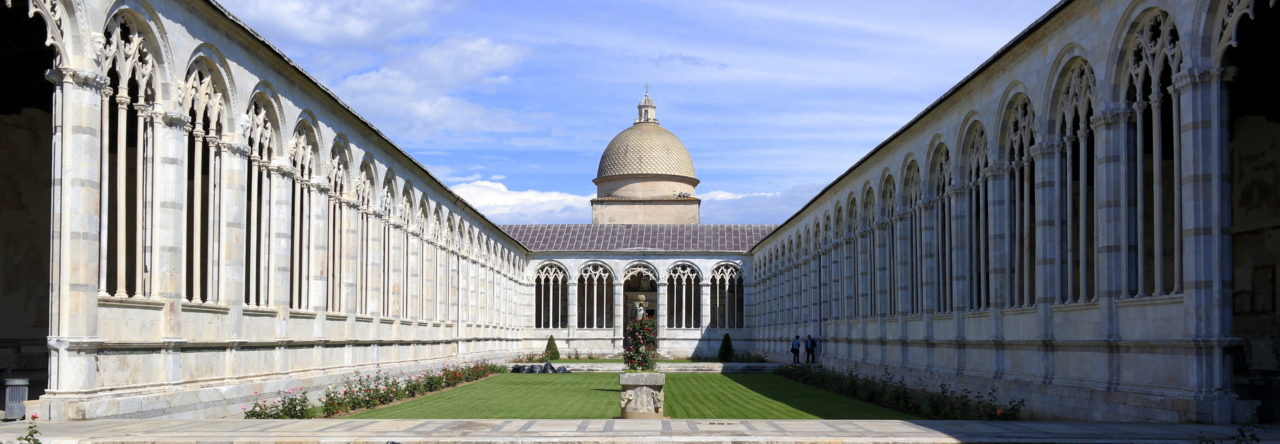 Pero Tafur (c. 1410 –c. 1484) was a nobleman from a Castilian family who participated in military campaigns of the Reconquista before he undertook a long journey around the Mediterrenean and across several parts of central Europe and Italy between 1436 and 1439. Although he visited Jerusalem and Palestine in the first part of his trip, his principal interest was more as an adventurer and religious themes played no particular role. Tafur composed the written account of his journey only several yeas later, in 1453/54. While he visited Pisa on the way to Rome, at the very beginning of his trip, the lengthy description of the city that we reproduce here is included in the very last chapters of the book, when Tafur was en route to Spain. His account of Pisa’s history is very characteristic for the entire book, as it relies exclusively on heresay and is full of phantastic and historically impossible claims. The central aim of this highly ficticious narrative is to give an explanation for Pisa’s decline, from a powerful sea republic to a satellite of Florence. In this framework, Pisa’s decision to sell Jerusalem is seen as the principle reason for its ultimate defeat. Therefore, the Camposanto plays a prominent role here, as a “container” of the holy earth. / DG
Pero Tafur (c. 1410 –c. 1484) was a nobleman from a Castilian family who participated in military campaigns of the Reconquista before he undertook a long journey around the Mediterrenean and across several parts of central Europe and Italy between 1436 and 1439. Although he visited Jerusalem and Palestine in the first part of his trip, his principal interest was more as an adventurer and religious themes played no particular role. Tafur composed the written account of his journey only several yeas later, in 1453/54. While he visited Pisa on the way to Rome, at the very beginning of his trip, the lengthy description of the city that we reproduce here is included in the very last chapters of the book, when Tafur was en route to Spain. His account of Pisa’s history is very characteristic for the entire book, as it relies exclusively on heresay and is full of phantastic and historically impossible claims. The central aim of this highly ficticious narrative is to give an explanation for Pisa’s decline, from a powerful sea republic to a satellite of Florence. In this framework, Pisa’s decision to sell Jerusalem is seen as the principle reason for its ultimate defeat. Therefore, the Camposanto plays a prominent role here, as a “container” of the holy earth. / DG
Ms_1985_excerpt Source: Manuscript copy, eighteenth century, Salamanca, Biblioteca Universitaria de Salamanca, Ms. 1985.
Edition: Pero Tafur, Andanças é viajes de Pero Tafur por diversas partes del mundo avidos (1435-1439), ed. Marcos Jiménez de la Espada, Colección de libros españoles raros ó curiosos, 8 (Madrid: Miguel Ginesta, 1874), 294-295.
Translation: Pero Tafur, Travels and Adventures 1435-1439, transl. Malcolm Letts (London: Routledge, 1926), 228-229.
“Esta çibdat de Pisa dizen que señoreó antiguamente la isla de Çeçilia, é Çerdeña, é Córçega é otras, é en la tierra firme grandes provinçias; é dizen que porque una vez pasó una nao que levava un cardenal é çiertos perlados de embaxada del Papa al rey de Françia, é porque non fezieron çierta salva acostumbrada, armaron luégo é pelearon con la nao, é dizen que la quemaon é el Papa, de que lo supo, indignado contra ellos, mandóles fazer guerra, é dió cruzada sobrellos, é fiziéronlos muy grant dapño. Mas, á ruego de algunos reyes é prinçpes, ovo el Papa de mitigar su furia, con condiçion que para que ellos fuesen asueltos, que ganasen la Casa Santa de Ierusalem. É ellos disposieron é fizieron una grant flota, é pasaron Ultramar é ganaron á Ierusalem con su terretorio, é la poseyeron çierto tiempo, é al fin, dízese, que porque les costaba mucho tenella, que la vendieron, donde se cree que les ha venido quanto mal tienen, que es dubda si en toda Pisa ay un natural della; é los sobrados les fezieron abaxar, é áun dizen, que, por desonrra, la barreta les fazen traer al revés, é son vituperio de la gente é sojudgados de aquellos que eran sus siervos. En aquella vez que ganaron á Ierusalem, dizen que ansimesmo fueron veneçianos é ginoveses, é quando ganaron á Ierusalem, al partir de aquel tesoro que allí ovieron, fizieron tres partes: en la una pusieron el Santo Grial, que es de una esmeralda, en la otra posieron dos colupnas, en las quales dizen que se veye cada uno el mal que le tractavan é lo que queríe él, en la otra pusieron todo el tesoro; é dizen que echaron suertes é cupo el Santo Vaso á Génova, do agora está, el qual yo ví, é las colupnas con Ierusalem á los pissanos, la quales truxeron á Pisa, é el tesoro á Veneja, é desto dizen que es toda su riqueza; é las colupnas que vinieron á Pisa, despues que vendieron á Ierusalem, perdieron su virtud. É está aquí una yglesia muy notable, é una claustra quel suelo della es de la tierra de aquel Campo Santo que fué comprado por los treynta dineros, que es en Ierusalem, é ainsí le llaman aquí en Pisa el Campo Santo, é dizen que persona que entierren allí non tura más de treynta dias, que la tierra lo gasta; sin dubda, grant fecho era esta çibdad antiguamente.”
“This city of Pisa, they say, owned at one time the islands of Sicily, Sardinia, and Corsica, with vast provinces on the mainland. But once a ship passed which carried a cardinal and certain prelates, ambassadors from the Pope to the King of France, without giving the accustomed salute. Thereupon the Pisans flew to the arms, and captured and burnt the ship, and the Pope, when he heard of it, was so incensed that he ordered war to be declared and proclaimed a crusade against them, and did them great damage. But on the entreaty of certain kings and princes, the Pope made an end of his wrath, on condition that the culprits should be absolved if they set out and captured the Holy City. Then the Pisans prepared a great fleet and passed over the seas, and took Jerusalem with its dependencies, and remained there some time, but finally they found it was too costly to retain the city and they sold it, from which act all their evils are believed to have come. It is to be doubted if there is now a single natural-born Pisan in the city. They had also to pull down their buildings, and, further, as a mark of dishonour, to wear their helmets reversed. Thus they are disdained by all men and are subjugated to those who were their servants.
It is said that when they captured Jerusalem, the Venetians and Genoese were also there, and after the city was taken they divided the treasure which they found into three parts. In one they placed the Holy Grail, which is made of a single emerald, in the second they placed two columns, in which each one can foresee the evils which are to befall him and whatever he desires, and in the third they placed the treasure. They then threw lots, and the Holy Grail fell to Genoa, where it now is, as I myself have seen, the columns, with the city of Jerusalem, came to the Pisans, which columns they brought to Pisa, and Venice took the treasure which is the foundation of all its wealth, but the columns which were brought to Pisa lost their virtue when Jerusalem was sold.
There is a very notable church and a cloister, the soil of which is from the holy field (Campo Santo) at Jerusalem, which was purchased with the thirty coins, and therefore they call it here in Pisa the Campo Santo. And they say that bodies interred here do not endure more than thirty days, as the earth consumes them. Without doubt, Pisa was formerly a great place.”
